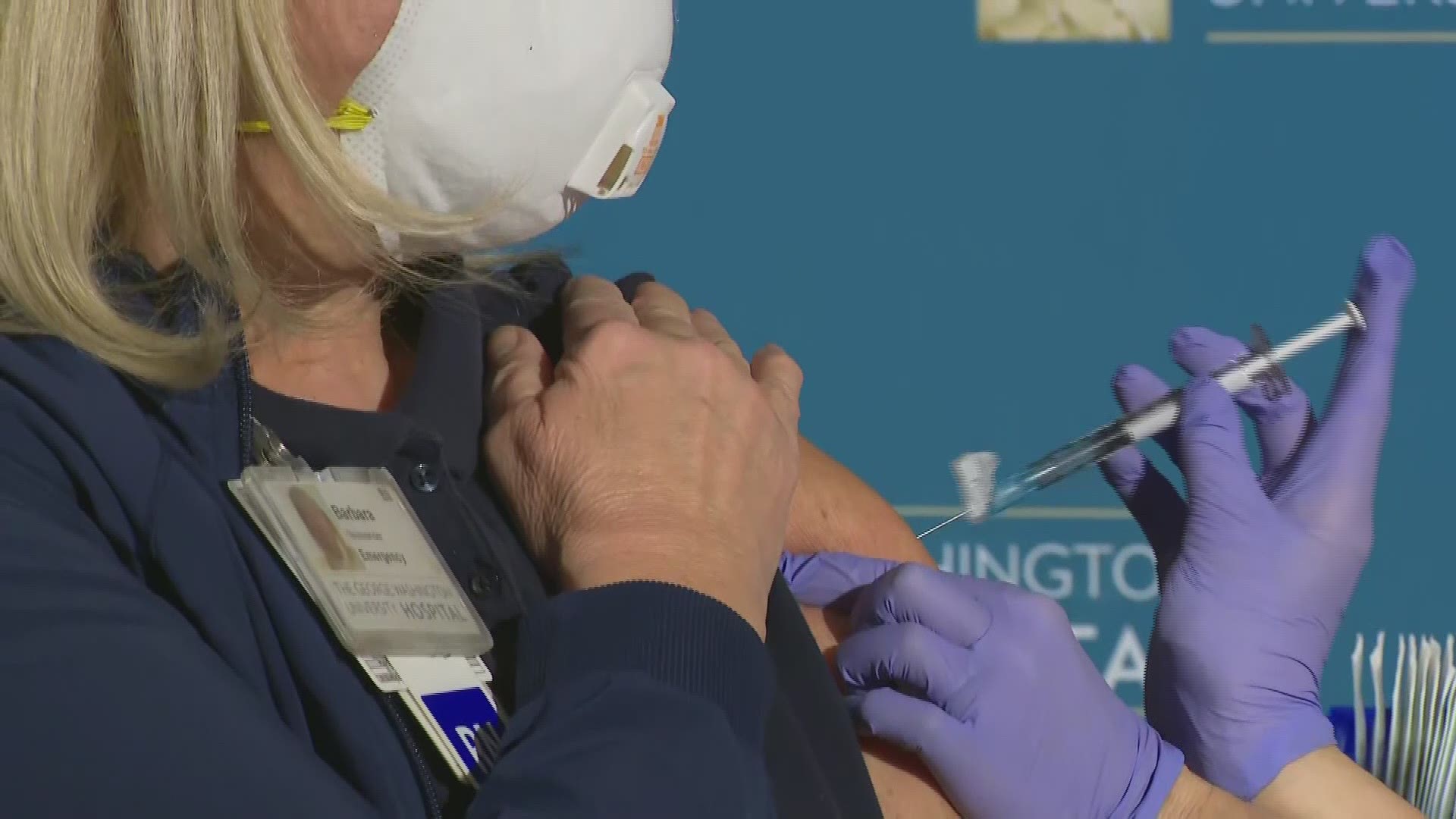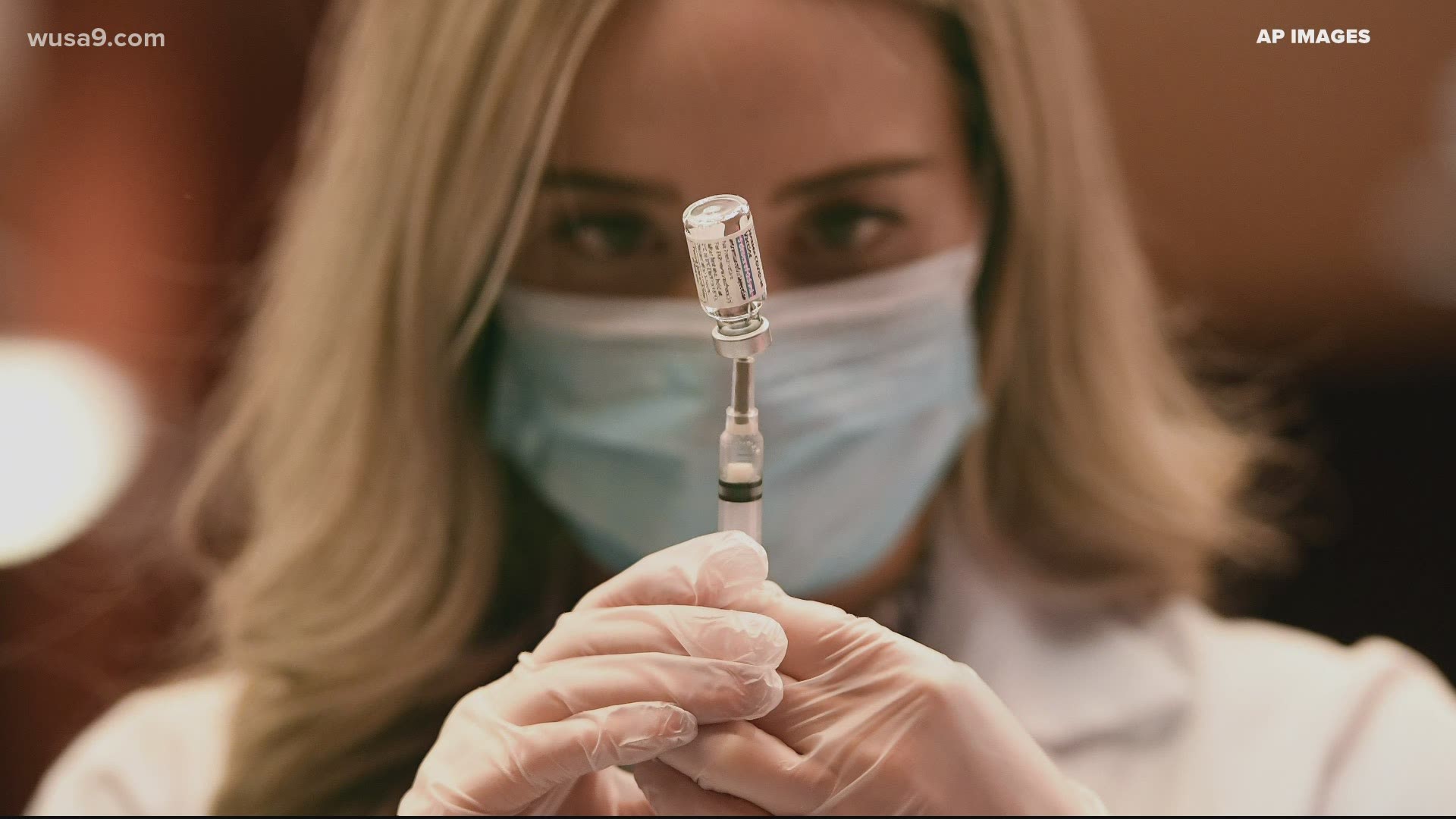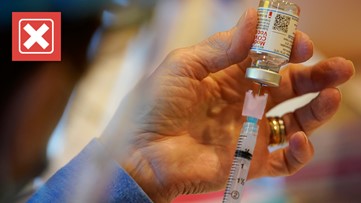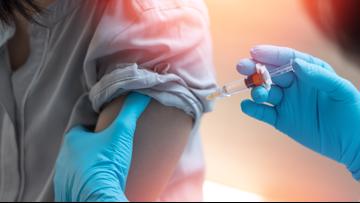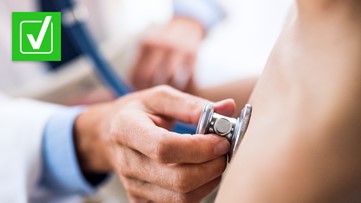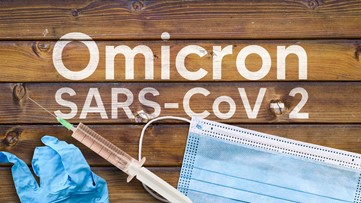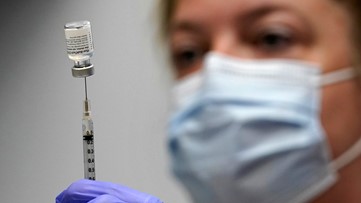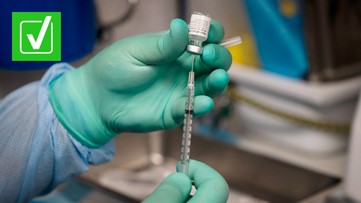WASHINGTON — More and more Americans are getting vaccinated, and with more vaccine shots comes more questions.
The Verify team is here to help. We're clearing up any confusion on the vaccination process, from safety measures to what you are able to safely do after your appointment.
Whether you are about to get your first dose or are looking for answers in between, we're covering everything you need to know.
GETTING A COVID VACCINE 101:
In March, the Verify team hosted a roundtable with five infectious disease experts and immunologists about the safety of the vaccines and what you can expect. You can watch the full vaccine discussion here:
Before the shot
Is the vaccine free?
While COVID-19 tests can range in price depending on what type of provider and what type of test you're taking, the COVID-19 vaccines themselves won't cost you money.
Both the Centers for Medicare and Medicaid Services and the CDC confirm you don't have to pay for any of the vaccines on the market, thanks to stipulations laid out in the CARES Act legislation this past spring.
The legislation protects insurers from applying what's known as "cost-sharing", aka co-payments and deductibles from occurring. It also helps protect doctors and pharmacies from billing patients for the costs, even if you might not have health insurance.
Another layer of protection: the CDC also mandates that vaccine providers must sign a "COVID-19 Vaccination Program Provider Agreement", which states they must not bill patients for the vaccines and the cost of administering them. It's an added layer of protection.
What are the three main vaccines on the market right now?
The three main vaccines currently in operation are:
- Pfizer-BioNTech
- Moderna
- Johnson & Johnson (Temporarily paused as of April 13)
The Johnson & Johnson vaccine only requires one dose, while Pfizer and Moderna require second dosages.
Want more on the differences between the three and their efficacy rates? Click here.
I'm pregnant. Should I avoid getting a COVID-19 shot?
Our experts said there is no evidence that the vaccine is unsafe for pregnant people or people who want to become pregnant.
The COVID-19 vaccines currently available in the United States did not include pregnant individuals in their trials. Because of this, the World Health Organization takes a more cautious approach to its recommendations. The organization says this is because "very little data are available to assess vaccine safety in pregnancy."
But, the WHO says it is important to measure whether the benefits of vaccination outweigh the risks. It told us, "For this reason, pregnant women at high risk of exposure to SARS-CoV-2 (e.g. health workers) or who have comorbidities which add to their risk of severe disease, maybe vaccinated in consultation with their health care provider."
The American College of Obstetricians and Gynecologists (ACOG) had been pushing the WHO to update its recommendations for getting vaccinated while pregnant. ACOG has consistently stated that the risks of getting sick with COVID-19 outweigh the risks of vaccination, and pregnant individuals should not be restricted from accessing the shot.
I currently have the flu. Should I get the shot?
If you’re not sick with COVID, but you have the flu or a cold, or you’re just not feeling well, our experts are split, saying it depends on the severity of your sickness.
"You've got a runny nose or a very mild cold, I think it should be fine for you to go ahead and get that COVID vaccine, but if you're sicker with moderate to more severe illness, that's something to certainly think about and discuss with your physician," Dr. Linda Nabha said. "You may be better off waiting until that sickness clears for you to get that COVID vaccine.”
One reason is so that if you begin to have symptoms like a fever or muscle aches, your doctor can differentiate between whether it's from your pre-existing illness or a new symptom resulting from the vaccine.
Dr. Amler calls it "common sense" to wait.
"Let's face it, you're going to get some side effects from the vaccine, in all likelihood a sore arm, maybe a low-grade fever, maybe a bad headache," Amler said. "I think logically you should wait until you're better, and in general, with any vaccines, if you have a fever, you certainly should not get a vaccine at that time. Wait until the fever is gone, and you're feeling better."
I just recovered from COVID-19. Should I get the shot?
The CDC says in the third section on their COVID-19 vaccine facts page that you should still get the vaccine even if you’ve already had COVID-19 and recovered.
The agency says that experts do not know how long someone is immune from getting sick again after recovering from the virus and that some early evidence may suggest it doesn’t last very long. They also don’t know how long immunity from vaccinations will last until they have more data.
I have allergies. Is it still safe to get the vaccine?
According to the CDC website and our experts, you don't need to worry about allergies to food when considering vaccination. However, if you are allergic to any of the ingredients in the vaccines, like polyethylene gylcol (PEG) or polysorbate, the CDC suggests consulting with a doctor before receiving a COVID-19 vaccine.
The CDC also has a whole page for specifics on allergies.
During your vaccine appointment

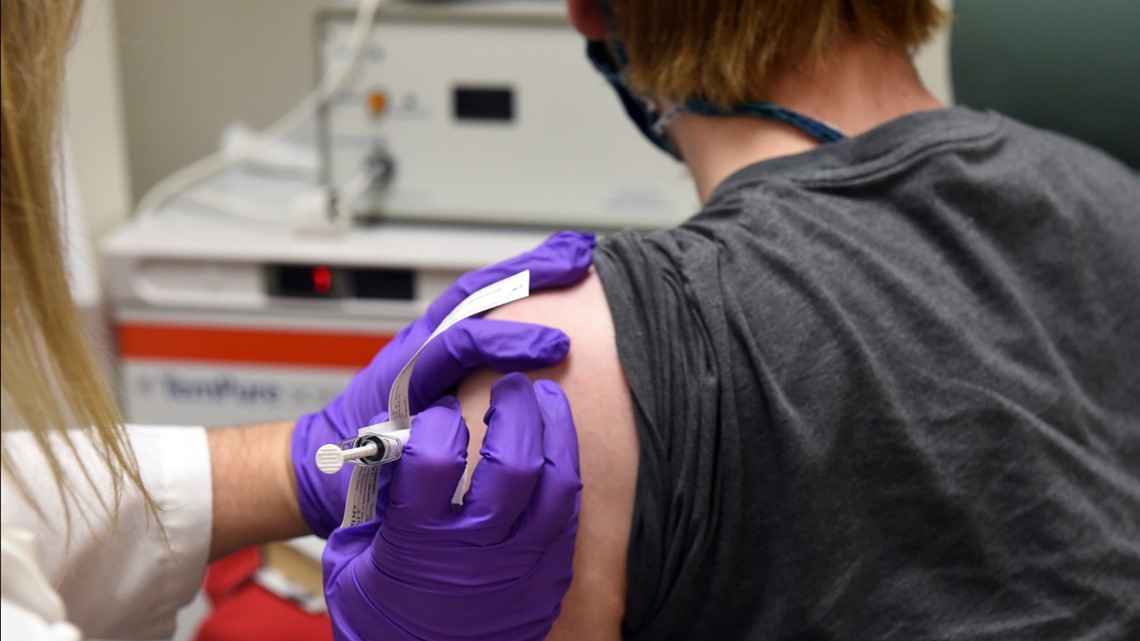
What do I need to bring with me to prove I am eligible?
The answer to this depends on where in the country you live, and can also be dependent on what county you're living in. State health departments have online portals to make and alert people of appointments, where guidelines and eligibility qualifications are listed.
Other places, like pharmacies and mass-vaccination sites, also have their own guidelines. It's best to double-check by calling where you are specifically are going to double-check what forms of ID you might need.
Can I chose what shot I get?
For the most part, no. But state health departments have recently allowed users to pick their preference when registering online, so it depends on where you live and how you are getting your vaccine.
“It's a complicated process, there are actually 50 separate state vaccine distribution plans,” Dr. Parekh said.
According to Dr. Parekh, each state gets its own proportional supply of the three vaccines. If you want to see how much, the Health and Human Services website shows the state by state allocation on a daily basis.
“Then the state needs to make the decision of where these doses should go, and, and what quantity should go, where,” Dr. Parekh continued.
From there, vaccines get distributed to the counties or health departments based on need.
“You know, whichever one is offered to you, you should really get that because the bottom line is all of these vaccines are nearly 100% effective in preventing hospitalizations and deaths,” Dr. Parekh said.
Can I switch arms on my second dose?
Yes.
The CDC points to a specific circumstance called "COVID arm" that can happen, requiring some to switch arms on their second dose.
Some vaccine recipients might experience a red, itchy, swollen rash at the injection site, and in those cases, the CDC says you can discuss getting your second shot in the other arm.
Can I mix and match vaccines?
You shouldn't mix and match the dosages. Stick with your prescribed vaccine and make sure to follow the proper timing between your first and second dosages. These vaccine dosages were made to be followed for their own brand, and act as a sort of "booster shot" to the first dose.
The CDC website agrees: “COVID-19 vaccines are not interchangeable with each other or with other COVID-19 vaccine products. The safety and efficacy of a mixed-product series have not been evaluated. Both doses of the series should be completed with the same product.”
After your shot


Will I automatically get a vaccine card?
When you get your vaccine, your healthcare provider or whoever is administrating the shot should give you an official CDC vaccination card with the date of your vaccine, type of shot, and when you are scheduled for your next dose if it's Pfizer or Moderna.
You shouldn't need to request one, and you will never have to pay for one or get it from any other place other than where you originally got your shots.
It should look something like this, or it might have handwritten notes instead of a sticker.

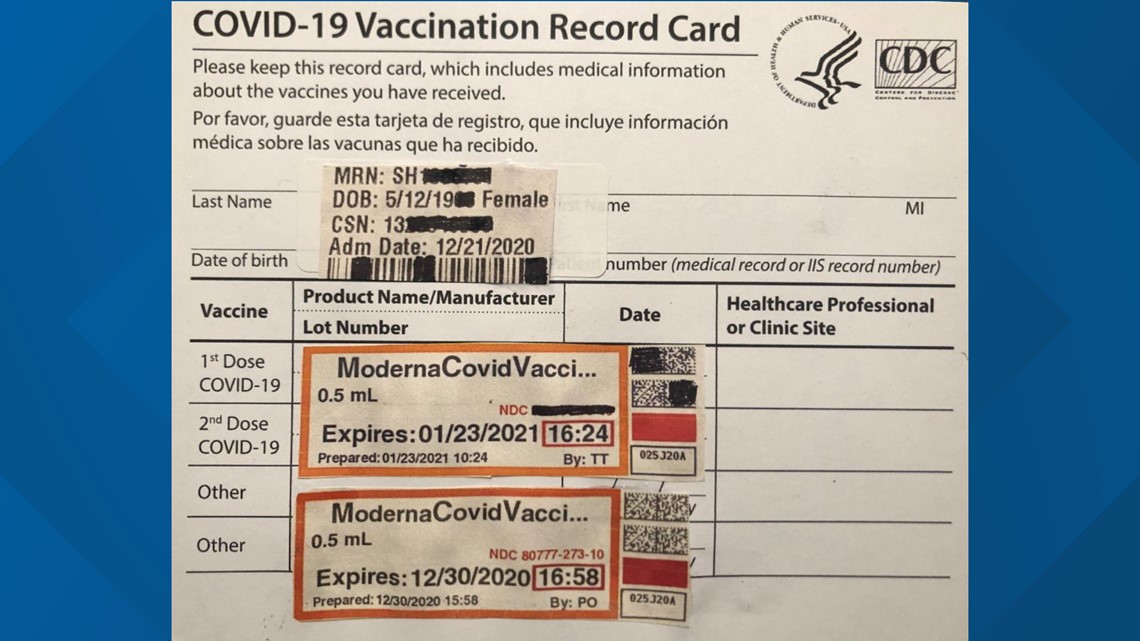
Can I drink alcohol?
You don't need to avoid alcohol after getting your shot -- there is no evidence to show that alcohol consumption will have an effect on how the vaccine works.
The FDA's vaccination guidance for the Pfizer, Moderna and Johnson & Johnson vaccines does not mention alcohol.
"I'm sure many people in the trials had a glass of wine, and maybe three during dinner. So that wasn't monitored," Dr. William Schaffner, a Division of Infectious Diseases professor at Vanderbilt University told our researchers. "There's no reason to believe from studying any other vaccine, that alcohol itself will somehow impair your immune response."
Dr. William Moss, the Executive Director of International Vaccine Access Center at Johns Hopkins, agrees: "Excessive alcohol consumption is bad for many reasons, but casual or moderate alcohol consumption will not impact the response to COVID-19 vaccines."
Can I work out?
There’s no evidence that says exercising after getting the shot will have an effect on your immune response. You're fully protected two weeks after your final dose, but our experts recommend masking, distancing, and even continuing to work out at home.
Can I take ibuprofen?
Yes, you can take ibuprofen after getting that shot. There is no evidence that says taking pain or fever medication will alter your immune response to the COVID-19 vaccines. If anything, they may help make the aftermath more comfortable.
Our experts, along with the CDC, say there is no reason to avoid those drugs after your shot.
"Suppressing a fever will not impair your immune response," Dr. William Schaffner told us. "Dampening side effects will allow you to feel better, but will not diminish your immune response to these strong vaccines."
The CDC has similar guidelines on its website: "You can take these medications to relieve post-vaccination side effects if you have no other medical reasons that prevent you from taking these medications normally."
Can I get a mammogram?
The vaccines can cause swollen lymph nodes in some people. When your radiologist sees a swollen lymph node during a mammogram, that can be a cause for concern and warrants a follow-up exam. Experts are trying to avoid false positives and unnecessary anxiety.
They suggest either scheduling your mammogram before your vaccine, or 4 to 6 weeks afterward.
More on mammograms from our experts here.
When you've been vaccinated, do you still need to quarantine after contact with someone who has COVID-19?
The CDC says you can avoid quarantining after known contact if you fulfill three criteria:
- It’s been at least two weeks since your final vaccine dose,
- It’s been no longer than 90 days since your final dose,
- And you have no symptoms.
The CDC told the Verify team that these criteria are subject to change as they learn more about the long-term efficacy of the vaccines on the market.
What to know about your vaccine card

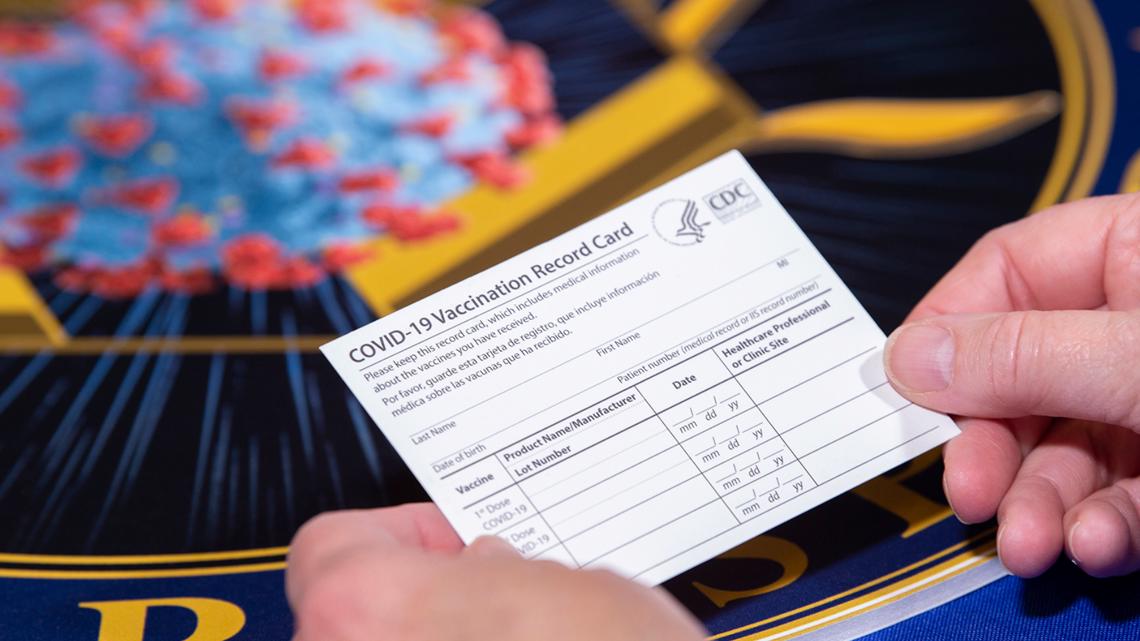
Can I laminate my vaccine card?
Currently, the CDC doesn't have a standard on whether or not you should laminate your COVID card, but you want to make sure you are able to use it in the future for any changes and to make sure the card is up to date.
Our experts said it's a good idea to make a photocopy of your card instead, and laminate that one. It is possible for lamination to ruin your vaccine card, depending on what type of stickers are used on the card.
"If your card has stickers that were printed using a thermal printer, then yes, the heat used during the lamination process will turn the sticker black and ruin it," a statement from Staples, who was offering free lamination, reads.
To tell if the sticker is a thermal one, Staples said to gently scratch it with your fingernail. If the scratch turns black, the sticker is thermal, and you shouldn't laminate the original card.
And remember, vaccination cards have personal information on them, so the FBI says to keep vaccine card pictures off of social media.
I lost my card. What next?
According to the CDC, there is no national organization that maintains vaccination records, and the CDC doesn’t have your vaccine record either.
The CDC says if you lose your vaccination card or want any of your vaccination records you have two options:
You can contact the facility that administered the vaccine, or reach out to your local or state immunization information program to see if they can help locate your records.
HOW TO ASK MORE VACCINE QUESTIONS: Have questions? Text the Verify team at 202-895-5599 or shoot us an email at VERIFY@WUSA9.COM. You can also fill out the contact form below which goes straight to the Verify team.
